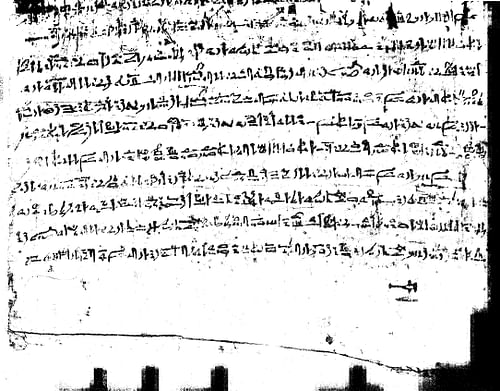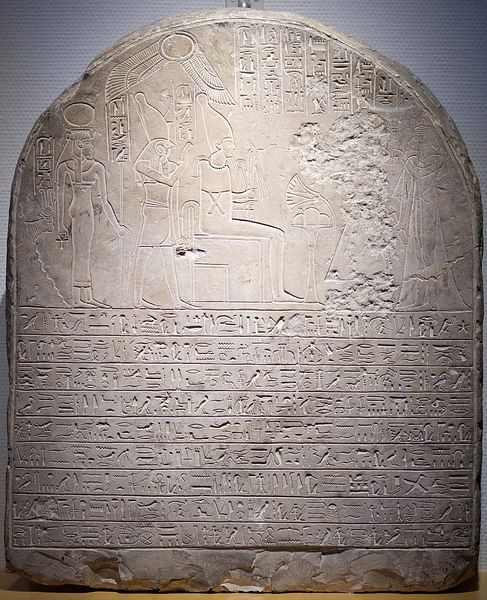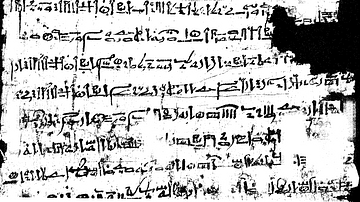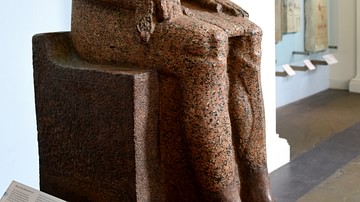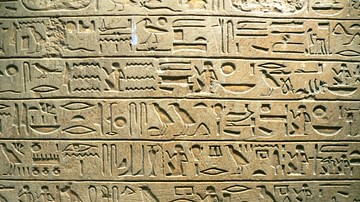The literature of the Middle Kingdom of Egypt (2040-1782 BCE) is justly famous as some of the best the culture ever produced. Great works like The Tale of the Shipwrecked Sailor and The Tale of Sinuhe stand among the great literary masterpieces of the world and there is no doubt that the literary arts in Egypt reached a high point during the Middle Kingdom. There are other works, however, often overlooked from before and after this period. The didactic literature of the Old Kingdom (c. 2613-2181 BCE) and the love poems and other works from the New Kingdom (c. 1570 - c. 1069 BCE) are often of equal merit.
Among the later works is a piece known as The Report of Wenamun (also The Tale of Wenamun), which was long regarded as an official account of an actual voyage but now is recognized as a literary work of impressive achievement. Wenamun dates from c. 1090-1075 BCE in the latter part of the New Kingdom after the golden days of the empire were in the past and Egypt had lost its international prestige. It is a first-person narration of a journey from Egypt to the Levant to get wood for the ship of the god Amun and the many difficulties the narrator experiences along the way; difficulties he feels he would not have known in the days of empire.
Reportage or Literature
Since the story takes the form of an official missive, it was first interpreted historically and is still regarded as historically accurate in its depiction of Egypt toward the end of the New Kingdom. Still, there are many details in the piece which contradict the claim that the work is reportage rather than literature. The use of dialogue, first of all, would not have appeared at such length in an official report, but one must also consider the tone, the character of the narrator, and the details of the other characters who appear in the story. The sympathetic presentation of non-Egyptians like the Tjeker and the prince of Byblos is a literary device, not part of an eye-witness account. Official reports throughout Egypt's history routinely portray non-Egyptians in unflattering ways.
Wenamun is not simply reporting an adventure but commenting on the all-too-human tendency to hold on to an image of one's self and the world which no longer applies in the present and the frustrations that involves. Wenamun never overtly laments the past glory of Egypt in his narration but his feelings about the present state of his country and how it is now regarded by others infuse the entire piece. The expedition is a simple one which should have been accomplished easily; instead, it turns into an adventure lasting over half a year or longer. The end of the manuscript is lost, and so one does not know what happens to Wenamun once he reaches the island of Alasiya (modern Cyprus). It is assumed that he finds his way home to Egypt since he is making his report to the king, but he could have had further adventures after Alasiya which kept him away longer.
Historical Background
The story takes place at the end of the New Kingdom/beginning of the Third Intermediate Period of Egypt (c. 1069-525 BCE). The central government at Per-Ramesses is no longer powerful enough to matter and the country's rule is divided between Tanis in the north (under the reign of Smendes) and Thebes in the south (under the control of Herihor, the High Priest of Amun). Tanis and Thebes co-ruled amicably in the beginning of the Third Intermediate Period, and this is alluded to when Wenamun leaves Thebes and stops at Tanis to request supplies from Smendes.
The goal of the expedition is to obtain wood (probably cedar) from Lebanon for the great ceremonial Barque of Amun at Thebes. Amun's ship was known to the Egyptians as Userhetamon, 'Mighty of Brow is Amun,' and was a gift to the city from Ahmose I (c. 1570 - c. 1544 BCE) following his victory over the Hyksos and ascension to the throne at the beginning of the New Kingdom of Egypt. The ship was used to transport the statue of Amun – in which the god was thought to reside – across the River Nile on festival and feast days. As it was the ship of the most powerful god, it was incredibly ornate and was repaired, painted, and rebuilt every year.
Wenamun's journey would have been a routine trip to pick up the wood necessary for the renovation. As the story – and other sources – makes clear, the royalty of Byblos and that of Egypt had a long-standing relationship in trade, and especially concerning wood for the Barque of Amun. Wenamun's perceived poor treatment at the hands of the authorities he encounters is symbolic of the loss in status Egypt suffered after the decline of the New Kingdom but, more importantly, comments on how people felt about that loss. Wenamun stands in for the Egyptians of the time in his insistence that the present conform to the glory of the past. What makes the piece timeless, however, is that people around the world still behave just as Wenamun does and continue to experience the same disappointment and frustration.
The Report of Wenamun Text
The following translation is by Egyptologist Miriam Lichtheim from Ancient Egyptian Literature: The New Kingdom, Volume II, pp. 224-229. The manuscript is missing words and a central section is missing so many lines that Lichtheim summarizes that part to keep the story's cohesion and momentum intact. The manuscript breaks off after the princess of Alasiya's line "spend the night." It is thought that there was considerably more to the story, although it is unclear what that claim is based on. It is entirely possible that, after he is saved by the princess, he simply goes back home. The story begins with Wenamun introducing himself and his mission:
Year 5, fourth month of summer, day 16, the day of departure of Wenamun, the Elder of the Portal of the Temple of Amun, Lord of Thrones-of-the-Two-Lands, to fetch timber for the great noble bark of Amen-Re, King of Gods, which is upon the river and [is called] Amen-user-he.
On the day of my arrival at Tanis, the place where Smendes and Tentamun are, I gave them the dispatches of Amen-Re, King of Gods. They had read them out before them and they said: "I will do, I will do as Amen-Re, King of Gods, our lord has said."
I stayed until the fourth month of summer in Tanis. Then Smendes and Tentamun sent me off with the ship's captain Mengebet, and I went down upon the great sea of Phoenicia in the first month summer, day 1. I arrived at Dor, a Tjeker town; and Beder, its prince, had fifty loaves, one jug of wine, and one ox-haunch brought to me. Then a man of my ship fled after stealing one vessel of gold worth 5 deben, four jars of silver worth 20 deben, and a bag with 11 deben of silver; [total of what he stole]: gold 5 deben, silver 31 deben.
That morning when I had risen, I went to where the prince was and said to him: "I have been robbed in your harbor. Now you are the prince of this land, you are the one who controls it. Search for my money! Indeed, the money belongs to Amen-Re, King of Gods, the lord of the lands. It belongs to Smendes; it belongs to Herihor, my lord, and [to] the other magnates of Egypt. It belongs to you; it belongs to Weret; it belongs to Mekmer; it belongs to Tjekerbaal, the prince of Byblos!" He said to me: "Are you serious? Are you joking? Indeed, I do not understand the demand you make to me. If it had been a thief belonging to my land who had gone down to your ship and had stolen your money, I would replace it for you from my storehouse, until your thief, whatever his name, had been found. But the thief who robbed you, he is yours, he belongs to your ship. Spend a few days here with me; I will search for him."
I stayed nine days moored in his harbor. Then I went to him and said to him: "Look, you have not found my money. [Let me depart] with the ship captains, with those who go to sea."
[The next eight lines are broken. Apparently, the prince advises Wenamun to wait some more, but Wenamun departs. He passes Tyre and approaches Byblos. Then he seizes thirty deben of silver from a ship he has encountered which belongs to the Tjeker, an obvious act of piracy. He tells the owners that he will keep the money until his money has been found. Through this action he incurs the enmity of the Tjeker.]
They departed and I celebrated [in] a tent on the shore of the sea in the harbor of Byblos. And [I made a hiding place for] Amun-of-the-Road and placed possessions in it. Then the prince of Byblos sent to me saying: "[Leave my] harbor!" I sent to him, saying: "Where shall [I go]? —————. If [you have a ship to carry me], let me be taken back to Egypt." I spent twenty-nine days in his harbor, and he spent time sending to me daily to say: "Leave my harbor!"
Now while he was offering to his gods, the god took hold of a young man [of] his young men and put him in a trance. He said to him: "Bring [the] god up! Bring the envoy who is carrying him! It is Amun who sent him. It is he who made him come!" Now it was while the entranced one was entranced that night that I had found a ship headed for Egypt. I had loaded all my belongings into it and was watching for the darkness, saying: "When it descends I will load the god so that no other eye shall see him."
Then the harbor master came to me, saying: "Wait until morning, says the prince!" I said to him: "Was it not you who daily took time to come to me, saying: 'Leave my harbor'? Do you now say: 'Wait this night,' in order to let the ship that I found depart, and then you will come to to say: 'Go away'?" He went and told it to the prince. Then the prince sent to the captain of the ship, saying: "Wait until morning, says the prince."
When morning came, he sent and brought me up, while the god rested in the tent where he was on the shore of the sea. I found him seated in his upper chamber with his back against a window, and the waves of the great sea of Phoenicia broke behind his head. I said to him: "Blessings of Amun!" He said to me: "How long is it to this day since you came from the place where Amun is?" I said to him: "Five whole months till now." He said to me: "If you are right, where is the dispatch of Amun that was in your hand? Where is the letter of the High Priest of Amun that was in your hand?" I said to him: "I gave them to Smendes and Tentamun." Then he became very angry and said to me: "Now then, dispatches, letters you have none. Where is the ship of pinewood that Smendes gave you? Where is its Phoenician crew? Did he not entrust you to this foreign ship's captain in order to have him kill you and have them throw you into the sea? From whom would one then seek the god? And you, from whom would one seek you?" So he said to me.
I said to him: "Is it not an Egyptian ship? Those who sail under Smendes are Egyptian crews. He has no Phoenician crews." He said to me: "Are there not twenty ships here in my harbor. that do business with Smendes? As for Sidon, that other [place] you passed, are there not another fifty ships there that do business with Werekter and haul to this house?"
I was silent in this great moment. Then he spoke to me, saying: "On what business have you come?" I said to him: "I have come in quest of timber for the great noble bark of Amen-Re, King of Gods. What your father did, what the father of your father did, you too will do it." So I said to him. He said to me: "True, they did it. If you pay me for doing it, I will do it. My relations carried out this business after Pharaoh had sent six ships laden with the goods of Egypt, and they had been unloaded into their storehouses. You, what have you brought for me?"
He had the daybook of his forefathers brought and had it read before me. They found entered in his book a thousand deben of silver and all sorts of things. He said to me: "If the ruler of Egypt were the lord of what is mine and I were his servant, he would not have sent silver and gold to say: 'Carry out the business of Amun.' It was not a royal gift that they gave to my father! I too, I am not your servant, nor am I the servant of him who sent you! If I shout aloud to the Lebanon, the sky opens and the logs lie here on the shore of the sea! Give me the sails you brought to move your ships, loaded with logs for [Egypt]! Give me the ropes you brought [to lash the pines] that I am to fell in order to make them for you ——, ——————— that I am to make for you for the sails of your ships; or the yards may be too heavy and break, and you may die [in] the midst of the sea. For Amun makes thunder in the sky ever since he placed Seth beside him! Indeed, Amun has founded all the lands. He founded them after having first founded the land of Egypt from which you have come. Thus craftsmanship came from it in order to reach the place where I am! Thus learning came from it in order to reach the place where I am! What are these foolish travels they made you do?"
I said to him: "Wrong! These are not foolish travels that I am doing. There is no ship on the river that does not belong to Amun. His is the sea and his the Lebanon of which you say, 'It is mine.' It is a growing ground for Amen-user-he, the lord of every ship. Truly, it was Amen-Re, King of Gods, who said to Herihor, my master: 'Send me!' And he made me come with this great god. But look, you have let this great god spend these twenty-nine days moored in your harbor. Did you not know that he was here? Is he not he who he was? You are prepared to haggle over the Lebanon with Amun, its lord? As to your saying, the former kings sent silver and gold: If they had owned life and health, they would not have sent these things. It was in place of life and health that they sent these things to your fathers! But Amen-Re, King of Gods, he is the lord of life and health, and he was the lord of your fathers! They passed their lifetimes offering to Amun. You too, you are the servant of Amun!
If you will say 'I will do' to Amun, and will carry out his business, you will live, you will prosper, you will be healthy; you will be beneficent to your whole land and your people. Do not desire what belongs to Amun-Re, King of Gods! Indeed, a lion loves his possessions! Have your scribe brought to me that I may send him to Smendes and Tentamun, the pillars Amun has set up for the north of his land; and they will send all that is needed. I will send him to them, saying 'Have it brought until I return to the south; then I shall refund you all your expenses'". So I said to him.
He placed my letter in the hand of his messenger; and he loaded the keel, the prow-piece, and the stern-piece, together with four other hewn logs, seven in all, and sent them to Egypt. His messenger who had gone to Egypt returned to me in Phoenicia in the first month of winter, Smendes and Tentamun having sent: four jars and one kakmen-vessel of gold; five jars of silver; ten garments of royal linen; ten hrd-garments of fine linen; five hundred smooth linen maats; five hundred ox-hides; five hundred ropes; twenty sacks of lentils; and thirty baskets of fish. And she sent to me: five garments of fine linen; five hrd-garments of fine linen; one sack of lentils; and five baskets of fish.
The prince rejoiced. He assigned three hundred men and three hundred oxen, and he set supervisors over them to have them fell the timbers. They were felled and they lay there during the winter. In the third month of summer they dragged them to the shore of the sea. The prince came out and stood by them, and he sent to me saying: "Come!" Now when I had been brought into his presence, the shadow of his sunshade fell on me. Then Penamun, a butler of his, intervened, saying "The shadow of Pharaoh, your lord, has fallen upon you." And he was angry with him and said: "Leave him alone."
As I stood before him, he addressed me, saying: "Look, the business my fathers did in the past, I have done it, although you did not do for me what your fathers did for mine. Look, the last of your timber has arrived and is ready. Do as I wish, and come to load it. For has it not been given to you? Do not come to look at the terror of the sea. For if you look at the terror of the sea, you will see my own! Indeed, I have not done to you what was done to the envoys of Khaemwese, after they had spent seventeen years in this land. They died on the spot." And he said to his butler: "Take him to see the tomb where they lie."
I said to him: "Do not make me see it. As for Khaemwese, the envoys he sent you were men and he himself was a man. You have not here one of his envoys, though you say: 'Go and see your companions.' Should you not rejoice and have a Stella [made] for yourself, and say on it: 'Amen-Re, King of Gods sent me Amun-of-the-Road, his envoy, together with Wenamun, his human envoy, in quest of timber for the great noble bark of Amen-Re, King of Gods. I felled it; I loaded it; I supplied my ships and my crews. I let them reach Egypt so as to beg for me from Amun fifty years of life over and above my allotted fate.' And if it comes to pass that in another day an envoy comes from the land of Egypt who knows writing and he reads out your name on the Stella, you will receive water of the west like the gods who are there."
He said to me: "A great speech of admonition is what you have said to me." I said to him: "As to the many [things] you have said to me: if I reach the place where the High Priest of Amun is and he sees your accomplishment, it is your accomplishment that will draw profit to you."
I went off to the shore of the sea, to where the logs were lying. And I saw eleven ships that had come in from the sea and belonged to the Tjeker [who were] saying: "Arrest him! Let no ship of his leave for the land of Egypt!" Then I sat down and wept. And the secretary of the prince came out to me and said to me: "What is it?" I said to him: "Do you not see the migrant birds going down to Egypt a second time? Look at them traveling to the cool water! Until when shall I be left here? For do you not see those who have come to arrest me?"
He went and told it to the prince. And the prince began to weep on account of the words said to him, for they were painful. He sent his secretary out to me, bringing two jugs of wine and a sheep. And he sent me Tentne, an Egyptian songstress who was with him, saying: "Sing for him! Do not let his heart be anxious." And he sent to me, saying: "Eat, drink; do not let your heart be anxious. You shall hear what I will say tomorrow."
When morning came, he had his assembly summoned. He stood in their midst and said to the Tjeker: "What have you come for?" They said to him: "We have come after the blasted ships that you are sending to Egypt with our enemy." He said to them: "I cannot arrest the envoy of Amun in my country. Let me send him off, and you go after him to arrest him."
He had me board and sent off from the harbor of the sea. And the wind drove me to the land of Alasiya. Then the town's people came out against me to kill me. But I forced my way through them to where Hatiba, the princess of the town was. I met her coming from one of her houses to enter another. I saluted her and said to the people who stood around her: "Is there not one among you who understands Egyptian?" And one among them said: "I understand it." I said to him: "Tell my lady that I have heard it said as far away as Thebes, the place where Amun is: 'If wrong is done in every town, in the land of Alasiya right is done.' Now is wrong done here too every day?"
She said: "What is it you have said?" I said to her: "If the sea rages and the wind drives me to the land where you are, will you let me be received so as to kill me, though I am the envoy of Amun? Look, as for me, they would search for me till the end of time. As for this crew of the prince of Byblos, whom they seek to kill, will not their lord find ten crews of yours and kill them also?" She had the people summoned and they were reprimanded. She said to me: "Spend the night…….”
